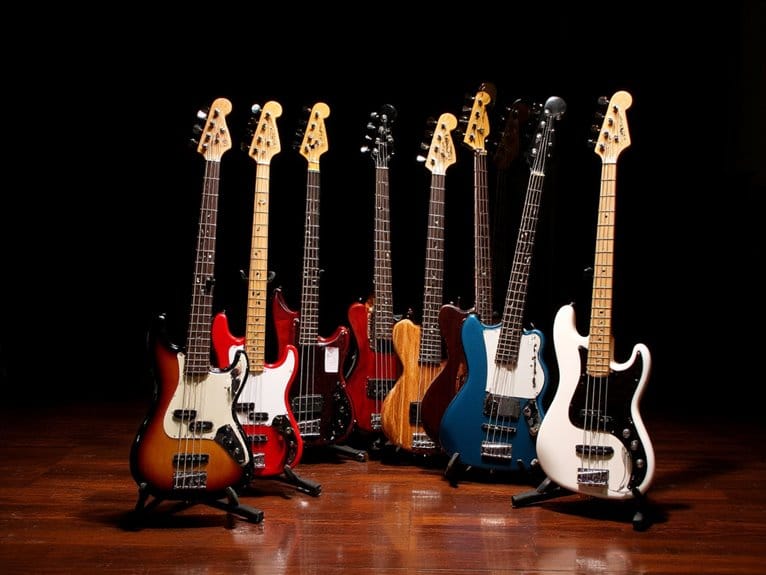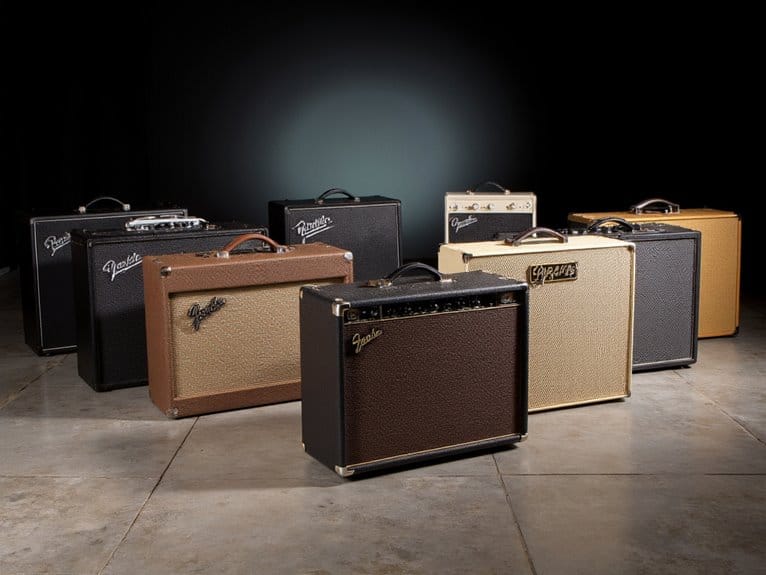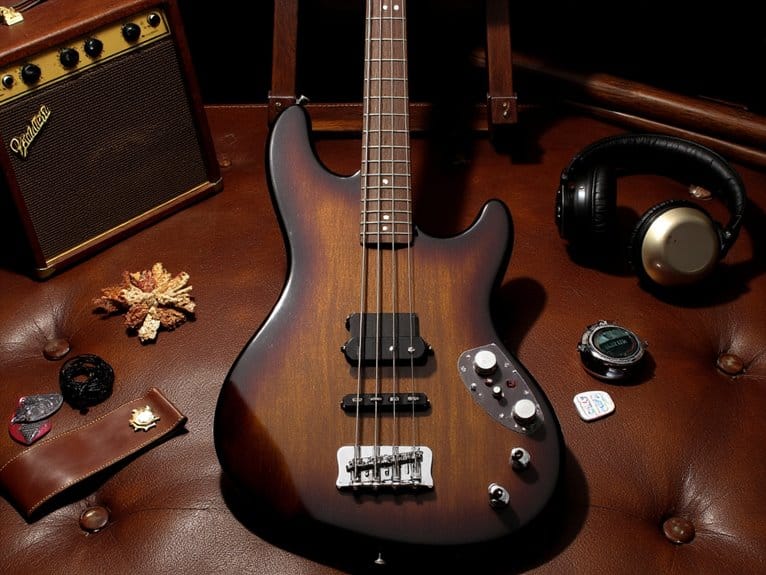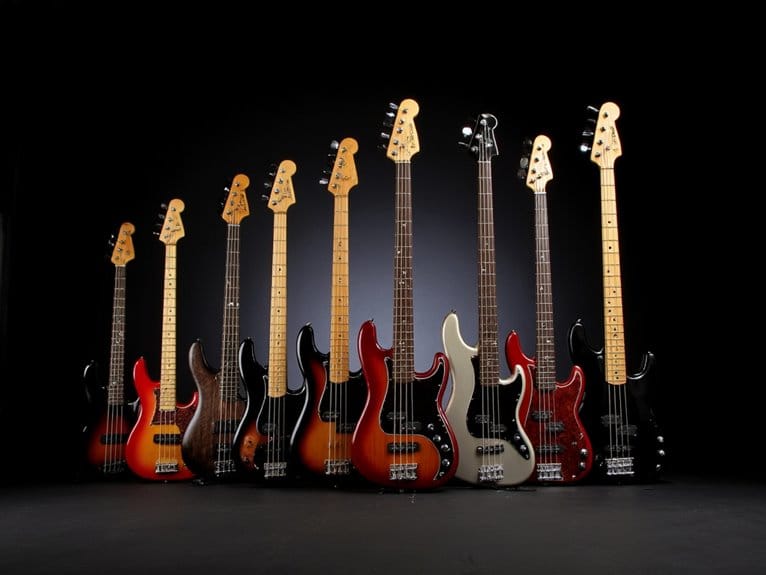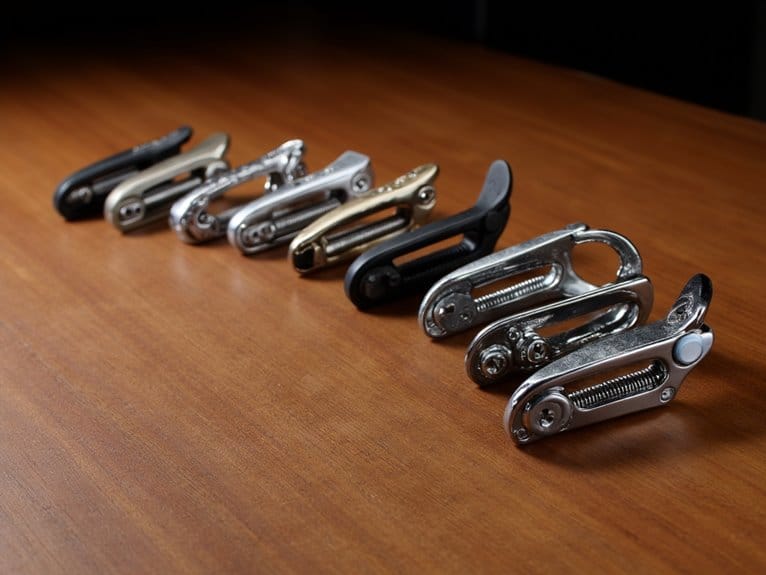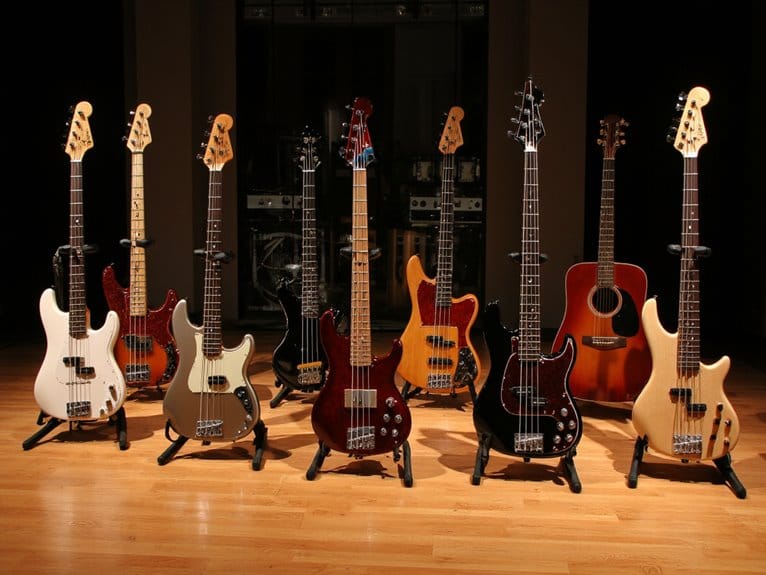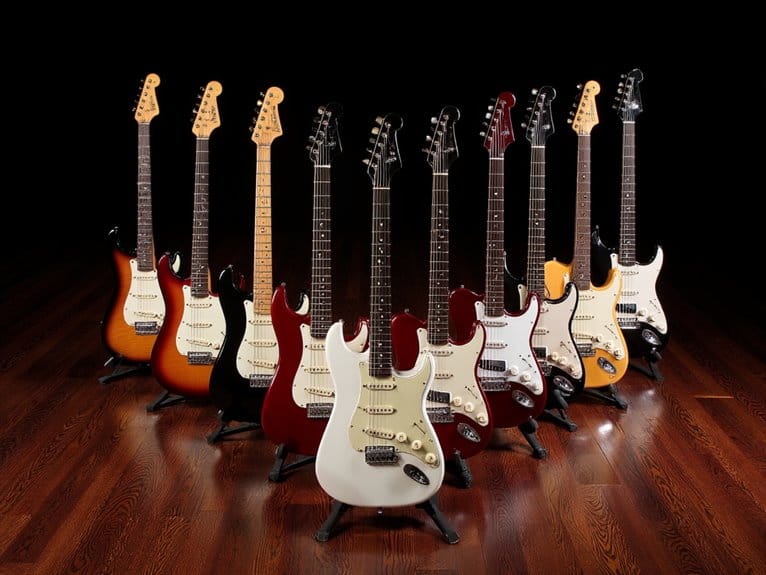10 Best Short Scale Bass Guitars – Perfect for Players of All Sizes
I’ve tested dozens of short scale basses, and the standouts for 2025 include the Ibanez GSRM20 MiKro with its exceptional 28.6-inch scale and punchy tone, the reliable Squier Mini Precision Bass that delivers authentic P-Bass sound, and the versatile Ibanez Talman TMB30 featuring guitar-like comfort. These instruments excel for beginners, players with smaller hands, and anyone seeking that warmer, rounded tone that comes from reduced string tension. Below, I’ll break down each model’s unique strengths to help you choose your perfect match.
We are supported by our audience. When you purchase through links on our site, we may earn an affiliate commission, at no extra cost for you. Learn more.
Notable Insights
- Short scale basses (28-30 inches) offer easier fretting, reduced finger fatigue, and enhanced comfort for players with smaller hands.
- Top models include Ibanez GSRM20 Mikro, Squier Mini Precision Bass, and Squier Sonic Bronco Bass for various budgets.
- These instruments provide warmer, deeper tones due to reduced string tension and shorter vibrating string length.
- Lightweight designs and compact bodies improve portability while reducing shoulder strain during extended playing sessions.
- Perfect for beginners, young musicians, guitarists transitioning to bass, and budget-conscious players seeking quality instruments.
Ibanez GSRM20 SLB Mikro Compact 4-String Electric Bass Guitar

The Ibanez GSRM20 SLB Mikro represents a compelling solution for players who need a genuine bass experience without the physical demands of a full-scale instrument, featuring a 28.6-inch scale length that bridges the gap between toy-like alternatives and traditional 34-inch basses. You’ll appreciate the poplar body with maple back and neck construction, which delivers surprisingly deep, punchy tones despite weighing only 6.9 pounds. The jatoba fretboard with white dot inlays provides comfortable playability, while the Dynamix P pickup configuration guarantees you’re getting authentic bass frequencies that don’t compromise on quality just because you’ve downsized your instrument choice.
Best For: Beginners, players with smaller hands, or anyone seeking a portable bass guitar that delivers authentic sound quality without the physical demands of a full-scale instrument.
Pros:
- Compact 28.6-inch scale length and lightweight 6.9-pound construction make it highly portable and comfortable for extended playing sessions
- Delivers surprisingly deep, punchy bass tones that rival full-scale instruments despite its smaller size
- Excellent value under $200 with quality maple and poplar construction, earning 4.6/5 stars from over 1,000 customers
Cons:
- May require setup adjustments upon arrival, including string height and neck relief modifications
- Gig bag not included, requiring an additional purchase for protection and transport
- 19mm string spacing might feel cramped for players accustomed to full-scale bass guitars
Ibanez GSRM20BS MiKro – Brown Sunburst

If you’re searching for a bass that won’t overwhelm smaller hands or cramped practice spaces, I’ve found the Ibanez GSRM20BS MiKro delivers impressive versatility in a surprisingly compact package. The 28.6″ scale length makes complex fingering patterns more manageable, while the poplar body and maple neck combination produces surprisingly rich tones that rival full-size instruments. At 8.5 pounds, you’ll appreciate how this brown sunburst beauty handles extended practice sessions without shoulder fatigue. The magnetic pickup configuration captures both punchy lows and articulate highs effectively, though I’d recommend copper tape shielding if you’re dealing with interference-heavy environments during live performances.
Best For: Beginners, players with smaller hands, students, and musicians needing a compact bass for limited practice spaces or travel situations.
Pros:
- Compact 28.6″ scale length and lightweight 8.5-pound design makes it highly manageable for extended playing sessions
- Delivers surprisingly rich and versatile tones that rival full-size instruments despite its smaller size
- Excellent value with high build quality standards and positive user feedback for both practice and live performance use
Cons:
- May experience noise issues in interference-prone environments without additional shielding modifications
- Shorter scale length might require adjustment period for players accustomed to full-size bass guitars
- Limited to 4-string configuration which may not suit players seeking extended range options
Squier Mini Precision Bass, Black, Laurel Fingerboard

Compact dimensions measuring 4×14.9×39.8 inches make the Squier Mini Precision Bass an exceptional choice for younger players, travelers, and anyone who finds full-size basses physically demanding during extended practice sessions. The poplar body construction, combined with a slim C-shaped maple neck, delivers surprising comfort while the split single-coil pickup produces authentic P Bass tones that’ve satisfied countless players over decades. At 8.35 pounds, it’s noticeably lighter than standard basses, though some users experience neck dive due to the reduced body mass. Rock Steady chrome tuners maintain tuning stability consistently, while the 4-saddle hardtail bridge guarantees accurate intonation across all strings.
Best For: Young players, travelers, and musicians with smaller hands who want authentic P Bass tones in a comfortable, portable package.
Pros:
- Compact 39.8-inch design with lightweight 8.35 lb body makes it ideal for extended playing sessions and portability
- Authentic split single-coil pickup delivers classic Precision Bass tones with reliable volume and tone controls
- Rock Steady chrome tuners and 4-saddle hardtail bridge provide excellent tuning stability and accurate intonation
Cons:
- Neck dive issues reported by some users due to the lightweight body construction
- May require setup adjustments after purchase including string replacement and height/intonation tweaks
- Short scale design may not appeal to players who prefer the feel and tone of full-scale bass guitars
Ibanez GSRM20 MiKro -Black

Musicians seeking an affordable entry point into bass playing will find the Ibanez GSRM20 MiKro in Black offers three compelling advantages that distinguish it from full-scale alternatives. First, its 28.6-inch scale length reduces string tension, making fretting markedly easier for developing fingers without sacrificing tonal quality. Second, the poplar body with maple neck combination delivers surprisingly robust sound through its STD P neck and STD J bridge pickup configuration, providing versatility across musical genres. Third, at just 6.8 pounds, you’ll experience minimal shoulder strain during extended practice sessions, while the jatoba fingerboard offers smooth playability that rivals instruments costing considerably more.
Best For: Beginner bassists, guitar players with smaller hands, and musicians seeking a lightweight, portable bass that maintains quality sound and playability.
Pros:
- 28.6-inch scale length reduces string tension for easier fretting and comfortable play
- Lightweight 6.8-pound design minimizes shoulder strain during extended practice sessions
- Versatile STD P neck and STD J bridge pickup configuration delivers robust sound across musical genres
Cons:
- Some units may require setup adjustments for optimal intonation and pickup performance
- Shorter scale length may not appeal to players accustomed to full-scale bass sound and feel
- Limited to 4-string configuration which may not suit players needing extended range
Squier Squier Sonic Bronco Bass, Arctic White, Maple Fingerboard

The Squier Sonic Bronco Bass stands out as an exceptional entry point for aspiring bassists, whether you’re a parent shopping for your 10-year-old or an adult finally ready to tackle that four-string itch you’ve been scratching for years. This Arctic White beauty features a comfortable 30-inch scale length paired with a narrow nut width, making those first fret stretches less intimidating than full-scale alternatives. Fender’s 75-year reputation backs this instrument, and you’ll get a 30-day Fender Play subscription with thousands of instructional videos to accelerate your learning curve. The chrome hardware and durable finish guarantee longevity, while the 2-year warranty protects against manufacturing defects.
Best For: Beginner bassists of all ages, especially kids and adults with smaller hands who want an easier-to-play instrument backed by Fender’s trusted quality and comprehensive learning resources.
Pros:
- Short 30-inch scale and narrow nut width make it highly accessible for beginners and players with smaller hands
- Includes 30-day free Fender Play subscription with thousands of instructional videos to support learning
- Backed by Fender’s 75-year legacy with quality chrome hardware, durable finish, and 2-year warranty protection
Cons:
- Short scale may limit tonal range and depth compared to full-scale basses
- Single pickup configuration provides fewer tonal options than multi-pickup designs
- May require upgrading to a full-scale bass as skills and musical needs advance
Ibanez Talman TMB30 Bass Guitar – Black

At thirty inches of scale length, the Ibanez Talman TMB30 bridges the gap between traditional bass playing and guitar-like comfort, making it an ideal choice for guitarists shifting to bass, players with smaller hands, or anyone seeking reduced string tension for faster playing. You’ll appreciate the thoughtful construction combining a poplar body with maple neck, creating balanced tone while maintaining structural integrity. The Dynamix PJ pickup configuration delivers impressive versatility, allowing you to dial in everything from punchy rock tones to smooth jazz lines with surprising clarity. At 11.05 pounds, it won’t strain your shoulder during extended sessions, though you may need minor setup adjustments out of the box.
Best For: Guitarists transitioning to bass, players with smaller hands, beginners seeking a comfortable instrument, and anyone wanting reduced string tension for faster playing styles.
Pros:
- 30-inch short scale length provides guitar-like comfort and reduced string tension for easier playing
- Versatile Dynamix PJ pickup configuration delivers clear tones across multiple genres from rock to jazz
- Lightweight at 11.05 pounds with well-balanced poplar body and maple neck construction
Cons:
- Requires setup adjustments out of the box for optimal performance
- Some components like pickguard and strings are perceived as lower quality
- May not satisfy players seeking traditional full-scale bass feel and tone
Mini Precision Bass®, Laurel Fingerboard, Dakota Red

Weighing just 10 pounds with a compact 42-inch length, this Dakota Red Mini Precision Bass® delivers authentic Fender tone in a package that’s particularly well-suited for younger players, traveling musicians, and guitarists making their first foray into bass territory. The basswood body houses a Squier split single-coil pickup that produces surprisingly robust sound quality, while the short-scale neck features a comfortable “C”-shaped profile that reduces hand strain during extended playing sessions. Though you’ll likely need some initial setup work—particularly intonation adjustments—the hardtail bridge provides reliable tuning stability, and the volume/tone controls offer sufficient sonic flexibility for most applications.
Best For: Young players, traveling musicians, and guitarists transitioning to bass who want authentic Fender tone in a compact, lightweight instrument that’s easier to handle than full-size basses.
Pros:
- Compact 42-inch length and 10-pound weight make it highly portable and comfortable for smaller players
- Authentic Squier split single-coil pickup delivers surprisingly robust sound quality comparable to full-size basses
- Short-scale neck with C-shaped profile reduces hand strain and makes it easier to play for extended sessions
Cons:
- Requires initial setup work, particularly intonation adjustments, before optimal playability
- Some players find it slightly head-heavy due to the compact body design
- No gig bag included and comes with small strap screws that may need upgrading
Ktaxon 4 String Electric Bass Guitar Kit with Accessories
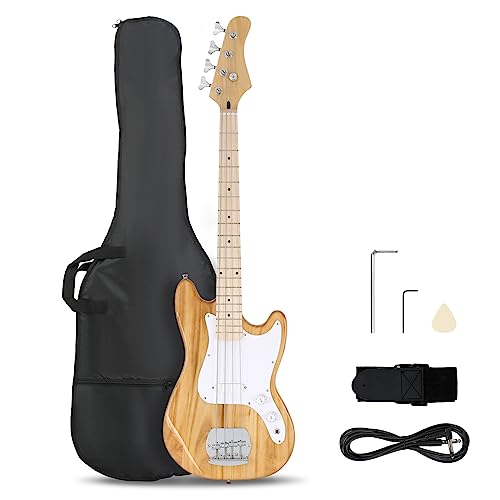
Priced around $70, this Ktaxon 4 String Electric Bass Guitar Kit delivers exceptional value for beginners who want to explore bass playing without breaking the bank, though I’ll be honest—you’ll likely want to make some modifications down the road. The basswood body and maple fretboard create a surprisingly decent foundation, while the included gig bag, strap, and cable mean you’re ready to play immediately. However, you’ll probably need to adjust the bridge height to eliminate fret buzz, and upgrading the pickup and strings will greatly improve the overall sound quality and playability experience.
Best For: Beginners and hobbyists who want an affordable entry point into bass playing and don’t mind making setup adjustments or modifications to optimize performance. These players will find that with the right tools and techniques, they can significantly enhance their playing experience. Additionally, understanding the basics of equipment setup can lead to bass amp performance advantages, allowing for a richer and more dynamic sound. Exploring different setups can also inspire creativity and help develop a personal style.
Pros:
- Complete starter kit includes gig bag, strap, and cable for immediate playability at an attractive $70 price point
- Solid construction with basswood body and maple fretboard provides a decent foundation for learning
- No assembly required and lightweight design makes it accessible for players with smaller hands
Cons:
- Requires setup adjustments like bridge height modification to eliminate fret buzz out of the box
- Components like pickups and strings will likely need upgrading for improved sound quality
- Some build quality issues including a flimsy nut and potential neck dive during play
Fender Squier Debut Series Precision Bass Guitar, Beginner Guitar with 2-Year Warranty

The Fender Squier Debut Series Precision Bass stands out as the ideal choice for absolute beginners who want a legitimate instrument backed by Fender’s 75-year legacy, rather than a toy that’ll end up collecting dust in six months. You’re getting a proper 34-inch scale bass with a C-shaped neck, laurel fingerboard, and split-coil pickup that delivers authentic Precision Bass tone. At $130, the poplar body construction and vintage-style tuning machines offer surprising build quality, though you’ll likely want to upgrade the stock strings. The 2-year warranty and included Fender Play subscription sweeten the deal considerably for newcomers.
Best For: Absolute beginners who want an authentic bass guitar experience with proper Precision Bass tone and the backing of Fender’s reputation, rather than settling for a toy-quality instrument.
Pros:
- Authentic Fender legacy with 75-year craftsmanship reputation, featuring genuine Precision Bass tone through split-coil pickup configuration
- Exceptional value at $130 with surprising build quality, 2-year warranty, and included Fender Play subscription for learning
- Proper full-scale 34-inch bass with comfortable C-shaped neck and playable setup straight out of the box
Cons:
- Stock strings typically need upgrading for optimal sound quality and performance
- May require setup adjustments including neck and bridge tweaks to match personal playing preferences
- Basic poplar body construction and entry-level components limit long-term growth potential for advancing players
Factors to Consider When Choosing a Short Scale Bass
When I’m helping someone choose their first short scale bass, I always emphasize that several key factors will dramatically impact their playing experience, comfort level, and overall satisfaction with the instrument. The scale length affects string tension and fret spacing, while body size influences weight distribution and ergonomics, and pickup configurations determine the tonal versatility you’ll have at your disposal. I’ve found that neck profile comfort and string tension differences are often overlooked by beginners, yet these elements can make or break your relationship with a particular bass guitar.
Scale Length Impact
Understanding how scale length affects your playing experience becomes essential once you realize that those 2-4 inches make a significant difference in both sound and feel. I’ve noticed that short scale basses, typically measuring 28-30 inches, produce a warmer, deeper tone due to how the shorter strings vibrate differently than their longer counterparts. The reduced scale length creates noticeable changes in string tension, which translates to easier fretting and less finger fatigue during extended sessions. You’ll find the lighter gauge strings commonly used on short scale instruments contribute to this enhanced playability, making note bending more accessible. For players with smaller hands, I can’t overstate how much more comfortable maneuvering the fretboard becomes when you’re not stretching to reach those wider intervals.
Body Size Considerations
Beyond scale length’s impact on playability, body size becomes another defining characteristic that’ll shape your entire relationship with the instrument. I’ve found that short scale basses‘ reduced body dimensions offer significant advantages beyond mere portability, particularly when you’re dealing with cramped practice spaces or extended playing sessions where comfort becomes paramount.
The compact design translates into real-world benefits I consistently notice during performances, especially in tight venues where maneuvering a full-size bass becomes challenging. You’ll appreciate how the smaller body reduces shoulder strain during longer gigs, while the narrower profile makes transportation considerably easier whether you’re navigating crowded stages or simply moving between your car and rehearsal space. These ergonomic improvements don’t compromise the instrument’s functionality, they enhance your overall playing experience through thoughtful dimensional optimization.
Pickup Configuration Options
While body dimensions affect physical comfort, pickup configuration ultimately determines the sonic character that’ll define your short scale bass’s personality across different musical contexts. I’ve found that single-coil pickups deliver bright, articulate tones perfect for funk and rock, while humbuckers provide warmer, fuller sounds with reduced electromagnetic interference. The P/J configuration remains my go-to recommendation, combining a neck-positioned Precision pickup’s thick foundation with a bridge Jazz pickup’s clarity and punch. This versatile setup allows seamless tone blending, adapting from vintage Motown thump to modern slap techniques. Consider your playing style carefully—neck pickups emphasize warmth and sustain, bridge pickups offer attack and definition, making pickup placement vital for achieving your desired sonic palette.
Neck Profile Comfort
Three critical elements define neck profile comfort on short scale basses: shape, material, and setup quality, each directly impacting your playing endurance and technique development. I’ve found that slim C-shaped profiles work exceptionally well for players with smaller hands, though they’re equally beneficial for beginners who haven’t developed finger strength yet. The 28-30 inch scale length brings frets closer together, reducing the stretch required for complex passages and minimizing strain during extended sessions. Neck materials like maple or jatoba influence both tactile feel and tonal response, while proper setup adjustments for action height and relief promote ideal playability. Weight distribution matters too – I’ve noticed that well-balanced instruments make even chunky necks feel more manageable during longer performances.
String Tension Differences
String tension represents the most fundamental difference you’ll experience when shifting from long scale to short scale bass guitars, and honestly, I underestimated how dramatically this change would affect my playing style when I first made the change. The reduced 30-inch scale length creates considerably lower string tension, which translates to a lighter, more responsive feel under your fingers, making fretting and bending remarkably easier. This decreased tension produces that characteristic warm, rounded tone that’s become synonymous with short scale instruments, though you’ll need to take into account lighter gauge strings, typically ranging from .040 to .095, to maintain peak playability. The setup requirements change too, since lighter tension affects action and intonation in ways that require careful adjustment.
Tone Quality Factors
Beyond the immediate feel differences I covered earlier, tone quality becomes the defining characteristic that’ll ultimately determine whether a short scale bass fits your musical vision, and frankly, it’s where these instruments either shine brilliantly or fall short of expectations. The inherent warmth and punch from reduced string tension creates a naturally compressed sound that works exceptionally well for vintage-inspired genres, though you’ll need to take into account how pickup configurations complement this foundation. P/J setups offer the versatility most players crave, delivering both the classic Precision thump and Jazz brightness when needed. String material choice becomes essential here, with flatwounds providing that smooth, acoustic-like character that many short scale enthusiasts prefer, while the body wood selection, whether poplar or maple, influences sustain and overall projection considerably.
On a final note
I’ve tested countless short scale basses throughout my reviewing career, and these models represent the best value propositions across different price points and player needs. Whether you’re drawn to the reliable Ibanez Mikro series, the classic Squier Mini Precision designs, or budget-friendly Ktaxon options, each instrument offers distinct advantages for smaller-framed players or those seeking enhanced comfort during extended playing sessions.

